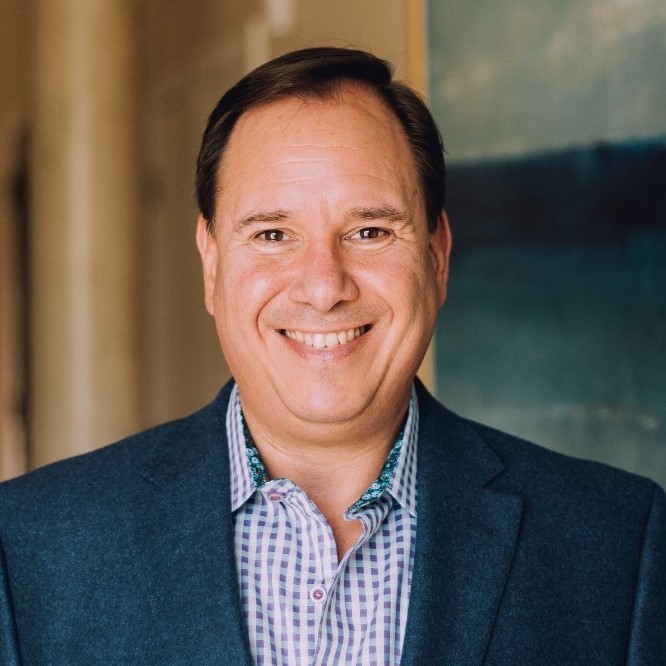
Bryan Bonuomo
Executive MBA – Strategic Leadership Class of 2006
Founder: Patonce Partners
Patonce Partners founder Bryan Bonuomo realized his passion for leadership early.
“My leadership journey started pre-high school,” Bonuomo explained. “I learned the nuggets of leadership starting in the Boy Scouts of America. I worked with peers and learned to solve problems, allocate resources, schedule tasks and do the ‘hard stuff’ first.”
For Bonuomo, many of these foundational lessons were reinforced on the playing field as a student athlete and later in his military career. Throughout his life, his perspective on authentic, value-driven leadership remained constant.
“Leadership for me is values in action,” he said. “And no one leadership style is good for all people and all situations.”
A Passion for Empowering Others
Bonuomo spent his early career in the military, and after eight years on active duty, he was ready for the next challenge. He sought a career that would play to his strengths: a passion for people and strong business acumen.
“I read about a career field emerging at the time called human resources, and it really resonated with me,” Bonuomo said. “That exploration launched a 25+-year career in human resources.”
With an appetite for new challenges, even from the beginning, Bonuomo never saw himself as a traditional HR employee. He leveraged his business strengths across many roles and industries, including automotive, food, apparel, energy, telecom and IT. In every role, regardless of title or industry, he led with a people-first mentality that helped optimize his employees’ talents and grow his organizations.
The EMBA Advantage
One of Bonuomo’s career goals was to become the vice president of a Fortune 500 company before turning 40. He exceeded his goal, becoming vice president of human resources at a subsidiary of Volvo, a Fortune 200 company.
Knowing his ability to influence his company and colleagues in that role and armed with a hunger for knowledge, Bonuomo decided it was time to pursue higher education. He debated between a master’s in public health, business administration or law and ultimately decided developing his executive business acumen would make the greatest impact in the years ahead.
“I had a lot of practical, on-the-job learning, but I was a pre-med major as an undergraduate,” Bonuomo explained. “I wanted to learn the business theory, and that’s why I entered the program.”
Bonuomo joined the 2006 cohort of what was then known simply as the Haslam Executive MBA (EMBA) program, using the program’s insights to better understand the business environment of his full-time executive role.
From the Boardroom to the Classroom
In addition to classroom learning, Bonuomo thoroughly enjoyed the EMBA program’s leadership development component. Working one-on-one with an executive coach helped him to reflect on his strengths and long-term goals as a leader. He realized he wanted to extend the same opportunity to other executives.
In 2015, after twice declining the opportunity to become chief human resources officer for a billion-dollar business, he realized it was time to make a change. He launched his own executive consulting practice, Patonce Partners, to invest in building leaders.
“I realized I wanted to be part of helping organizations perform in a healthier way, and the point of leverage was with senior leaders,” he said. “And the way I could impact senior leaders was by giving them a space to be honest.”
Five years later, Bonuomo accepted an opportunity to return to UT’s Graduate and Executive Education department, which houses the Executive MBA – Strategic Leadership (EMBA-SL), as a lecturer. Now on the faculty side of the table, Bonuomo relates his own experiences to help students succeed.
“I think it’s stayed true to its core since I graduated, and it’s only gone farther and further,” Bonuomo said. “I’ve encountered dozens of MBA programs, and I haven’t found another one that does what we do.”
Embracing Enterprise Thinking
Today, Bonuomo continues coaching his clients and students and is still a dedicated advocate of the EMBA-SL program’s structure and outcomes. With a one-year timeline and an integrated curriculum, the program teaches executives to think broadly to approach problems and solutions from an enterprise perspective.
“The MBA taught me about business at a senior level,” Bonuomo said. “To really understand how an enterprise comes together to work was invaluable for me as a C-Suite executive. And, as a coach, one of the most common deficiencies that CEOs share with me is a lack of enterprise thinking in the C-suite. This program equips executives to leave their roles behind and think from an enterprise standpoint.”
Additionally, Bonuomo teaches students to navigate real-world challenges, making decisions in the face of incomplete information, ambiguity and limited resources.
“The way you approach work in this program does not look like the way you approached work as an undergraduate,” Bonuomo said. “This is not a lay-up. You will apply yourself.”
EMBA Words of Wisdom
For leaders considering an executive MBA, Bonuomo emphasized the support he received during the program, and that he now extends to students as a faculty member.
“Always recognize that everyone around you wants you to succeed as much, or even more than, you do,” Bonuomo said. “That includes your peer group, cohort, alumni, faculty, staff and administration. We exist solely to help you cross the finish line.”
For Bonuomo, overcoming academic and professional challenges during the program helped him grow immensely. As a faculty member, he advocates for leaders to face these obstacles head-on.
“Everybody feels overwhelmed at a certain point,” he said. “You have experienced things in your work and personal life you overcame, and you will overcome this too. The knowledge that you did something that you were convinced you could not is the most valuable thing you’ll take away from this program.”